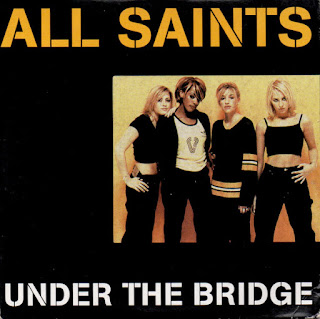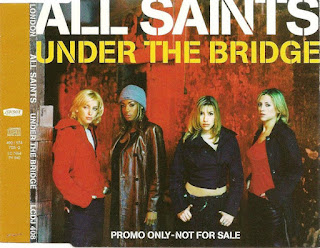RED HOT CHILI PEPPERS / ALL SAINTS - UNDER THE BRIDGE
Red Hot Chili Peppers version Released: March 2, 1992
Charted: US: #2 UK:#13
All Saints version Released: April 27, 1998
Charted: UK: #1 (2 weeks)
"Under the Bridge" stands as a poignant track by the Red Hot Chili Peppers from their album "Blood Sugar Sex Magik" (1991). Lead vocalist Anthony Kiedis wrote the lyrics, delving into themes of solitude and the challenges of drug sobriety. Initially hesitant to share it with the band, Kiedis's introspective composition struck a chord upon its release in March 1992 via Warner Bros. Records. Critics and fans alike lauded its emotional depth, propelling it to become the band's highest-charting single. It peaked at number two on the Billboard Hot 100 and clinched the top spot on the Cash Box Top 100, ultimately achieving platinum certification. Directed by Gus Van Sant, the song's music video was shot in Los Angeles.
"Under the Bridge" originated as a deeply personal poem penned by Anthony Kiedis, the frontman of the Red Hot Chili Peppers. Initially, Kiedis didn't conceive it for the band; rather, it was a private reflection captured in his notebook. It was only when their producer, Rick Rubin, stumbled upon the poem that its potential as a song emerged. Despite Kiedis's initial reluctance to share his intimate creation, Rubin saw its promise and encouraged him to explore it musically.
Rubin recounted how Kiedis was initially hesitant to present it to the band. However, once Kiedis shared the poem with guitarist John Frusciante and bassist Flea, they each contributed their musical prowess, transforming the poem into a compelling song. Despite their initial reservations, the band recognized the power of "Under the Bridge" as it resonated deeply with listeners, ultimately becoming one of their most beloved and acclaimed tracks.
In his memoir "Scar Tissue," Anthony Kiedis recounts the genesis of "Under the Bridge" and its deeply personal origins. He reveals that the lyrics were born out of a moment of introspection while driving home from a Red Hot Chili Peppers session. Feeling isolated from the deepening friendship between John Frusciante and Flea, Kiedis also grappled with the loss of Hillel Slovak, the band's original guitarist, to a drug overdose in 1988. It was during this solitary drive that the poignant opening line, "Sometimes I feel like I don't have a partner," emerged in his mind. Kiedis describes how he began improvising poetry, setting his emotions to a melody as he traveled down the freeway. Upon returning home, he meticulously transcribed his raw emotions into a structured song format, using his notebook as a vessel to channel his anguish into art.
Flea, in an interview with the Los Angeles Times, reflected on the profound resonance of the song, recognizing its ability to encapsulate the genuine and profound sense of loneliness experienced by many in the vast and bustling city of Los Angeles.
"Under the Bridge" took on new life when it became the third single from the debut album of English girl group All Saints, titled "All Saints" (1997). In the UK and Australia, the single was released as a double A-side, paired with a cover of Labelle's "Lady Marmalade." This release strategy proved successful, propelling "Under the Bridge" to the top spot on the UK Singles Chart, marking All Saints' second number-one single in the UK.
Their version made notable changes to the original lyrics, such as replacing "City of Angels" with "City of cities" and altering "I walk through her hills" to "I walk through his field." Additionally, the last verse, which contained drug references, was completely omitted from their rendition. These alterations transformed the song into a more conventional love song compared to the introspective original by the Red Hot Chili Peppers.
The All Saints version incorporates samples of the original recording, notably including the distinctive guitar playing at the beginning. The Red Hot Chili Peppers expressed dissatisfaction with this rendition. Anthony Kiedis felt that the cover was poorly executed. Moreover, the omission of the final verse, which contains personal and significant lyrics for Kiedis, detracted from the authenticity of the song. Kiedis remarked that All Saints' rendition seemed incongruous with the lyrical content, as the band members appeared unaware of the deeper meaning behind the lyrics. On the other hand, their version was well received by critics who gave them favorable comments.


















Cap comentari:
Publica un comentari a l'entrada